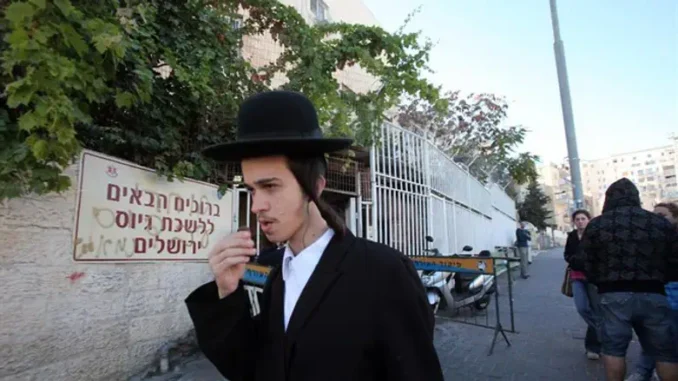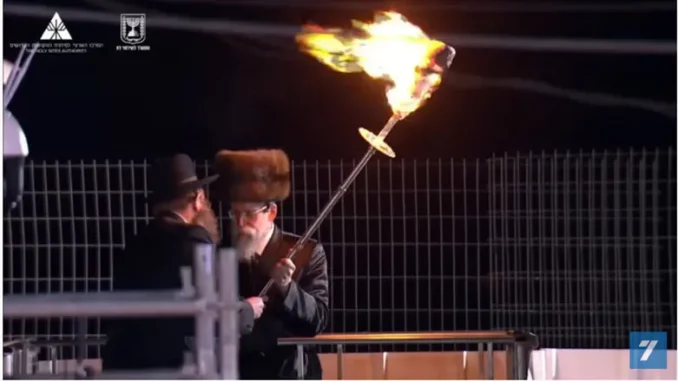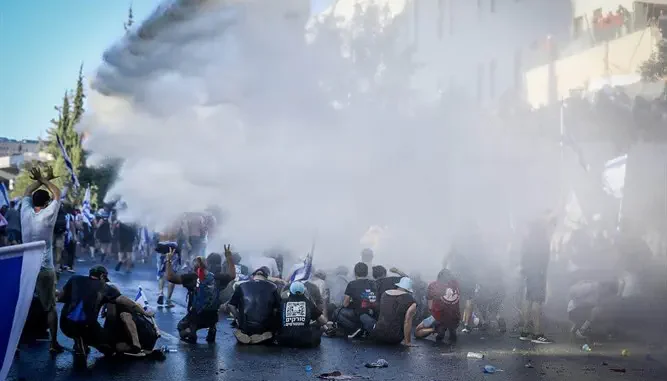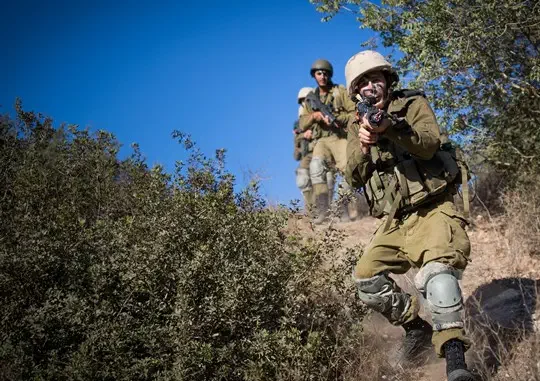The idea that all Jews are brothers, no matter what, is a basic, shared value in the one and only Jewish State, and everything that happens in it, controversies about haredi draft included, must rest on that truth. Opinion.
By Rochel Sylvetsky, INN 1 April 2024

Haredi near draft office
Protecting Jews in the Jewish State
This past Lag Ba’omer, I sent a link to a live broadcast of the Boyaner Hassidim’s annual festivities at Meron to a grandson, now deep in Gaza, but then a hesder (army-yeshiva program) student doing his combat IDF service during a period of relative quiet. The broadcast showed hundreds, perhaps thousands of bearded and black-hatted Hassidim watching as the Boyaner Rebbe lit the bonfire in memory of the Talmudic sage Rabbi Simeon Bar Yochai, an honor passed down to him by the first Sadigura Rebbe. It continued with the Hassidim and Rebbe singing and dancing until the early morning hours.
I asked my grandson to give thanks to the Almighty for granting him the privilege of protecting the Hassidim of Boyan while they chant the lyrics of “Bar Yochai” and “Amar Rabbi Akiva” in Meron. Only a few generations ago, I continued, most of your family looked like them, and some still do, but no one protected them. It doesn’t matter if they are Zionists like we are or whether they enlist in the IDF – they are Jews, and you are enormously privileged to guard them. How the Jews who lived in all the centuries preceding the establishment of the Jewish State would envy you!
 Rebbe of Boyan opens Lag Ba’omer celebrations at Meron
Rebbe of Boyan opens Lag Ba’omer celebrations at Meron
Once I thought that everyone in Israel shared my feelings about protecting our people, no matter what their lifestyles, in the one and only Jewish State established after thousands of years of antisemitic persecution aimed at helpless Jews.
Emanuel Moreno, the famous IDF hero whose photograph is not allowed to be made public even posthumously, grew up in the building in which our family spent its first decade after aliya. This was a building populated with new immigrants of varied religious and economic levels, hailing from the USA, UK, Russia, Georgia, Morocco, Iran, Switzerland and France. Perhaps it is this microcosmic “ingathering of the exiles” that helped form his character and filled him with such unconditional, selfless willingness to give his life for Israel.
I thought, as he did, that the idea that all Jews are brothers, no matter what, is a basic, shared value in the one and only Jewish State, and that everything that happens there, controversies included, rests on that truth.
Over the past pre-October 7th year, I learned to my disappointment, that there are Israelis who consider themselves unique, not because they are part of the Eternal People, but because they belong to an elite, privileged and often moneyed class. They are ready to destroy the country’s economy and weaken its army if democratically chosen leaders promote policies opposed to theirs, to find ways for their army-age offspring to avoid the draft or refuse to serve without ever stepping into a yeshiva, justify not caring about all Jews. They are not ashamed to express hatred and contempt for their fellow Jews.
 Anti-judicial reform protests
Anti-judicial reform protests
These are the people who have taken raucously to the streets again, shamelessly using the hostages as their excuse, although many of the hostage families decry their actions. These are the people orchestrating a divisive battle to cancel funding for haredi yeshivas and force the enlistment of full-time yeshiva students, this during a defensive war in which Israel faces unprecedented worldwide antisemitism, its police should be concentrating on thwarting terror aimed at civilians, and its leadership must make life and death decisions every day.
Army service postponement for Torah scholars has been in force since the beginning of the state, so it seems logical to ask why the debate about it does not wait for the war to end. The answer? Turning it into a hot issue now has more to do with another attempt to break up Benjamin Netanyahu’s coalition than a real desire to draft haredi young men.
Many of those pushing for punitive actions do not recognize the place of Torah learning in protecting the Jewish people, so that their chances of reaching an agreement with the haredi rabbinic leadership are nil. What they really want is to use the draft to foment disunity for political ends, all the while knowing that secular Tel Aviv is in 51st place in number of IDF combat unit recruits and that a a considerable number of its non-observant young men find ways to avoid all army service, a problem the army seems unwilling to tackle.
Miraculously, despite months of violent demonstrations, on October 7th and through the months of war that followed, unconditional love for fellow Jews and the resulting will to protect them were found to be alive and well. That feeling of shared destiny galvanized the IDF soldiers who rushed to the south on Simchat Torah of their own volition to rescue Gaza Envelope Israelis, it reigns supreme in the ranks of the IDF combatants now fighting in Gaza and characterizes most of the Israeli public, irrespective of religious observance or political views.
 Soldiers
Soldiers
Haredi vs. Religious Zionist ethos
In particular, the commandment to protect every Jew is an integral part of the value system common to both the Religious Zionist and haredi sectors, as is the belief that Torah study is what gives the state and the IDF its raison d’etre. The term used to describe this ethos is “Safra veSayfa,” which translates as living by “the holy book and the sword,” with Religious Zionists combining the two and haredim adhering to the “safra”, leaving the “sayfa” in the hands of those who do not learn Torah full time.
Religious Zionists believe that the Torah posits that their sons must protect the Jewish State physically as well as through learning Torah, and therefore created various frameworks that postpone active army service for 1-4 years so they can attend yeshiva before and after active IDF service. A few outstanding Torah scholars in that sector are told by their Rosh Yeshivas to remain in the “tent of Torah” longer to train for Torah leadership, but most of these eventually join the IDF as well.
In war, Religious Zionists have proven themselves to be well trained and motivated soldiers serving in disproportionate numbers in combat units, even though the last year of their mandatory army service is spent in yeshiva. Sadly, their resulting disproportionate representation in military cemeteries as well attests to their willingness to sacrifice their lives for the entire nation’s welfare.
The Torah defines two types of wars, wars that Jews are commanded to wage (wars of mitzva) and optional wars. In a “war of mitzva”, such as when a murderous enemy attacks the Jewish people, even a bridegroom is commanded to leave his wedding to join the fighting. The current war is a “war of mitzva” by definition, leading, in some Religious Zionist circles, to the breakdown of the justification for the haredi yeshiva world’s choice to have all its youth continue uninterrupted Torah study. It has made some Religious Zionists join the call of leftist organizations such as “Brothers in Arms” for an end to blanket exemptions for haredi Torah students and to demand mandatory basic training for those haredim who do not really spend their time leaning over the books of the Talmud.
The issue, however, is not so simple. Religious Zionism’s belief that taking part in the Jewish State’s army is a mitzva trumps the fact that the IDF has taken ungrateful advantage of this idealism, ignoring the sector’s rabbinic protests, by placing Religious Zionist soldiers in situations that test their Torah observance – such as serving with women under halakhically problematic conditions. The glass ceiling that seems to exist for religious officers when it comes to promotion to decision-making echelons, especially if they make any pronouncements that can be construed as expressing Torah beliefs, is another phenomenon that does not reflect well on the IDF, especially when contrasted with the many non-kippa wearing soldiers requesting tefillin and tzitzit (fringed garments), Torah scrolls and prayer services while in Gaza.
Haredim, while loving their fellow Jews, do not share the Religious Zionist idealistic, Torah-based view of a Jewish State and will not agree to army service that threatens their sons’ level of observance. That is why the IDF has no chance of obtaining the agreement of the haredi sector to join its ranks unless it eliminates the challenges to a soldier’s mitzva observance. The haredi leadership, perhaps not entirely incorrectly, also suspects that anti-religious forces see IDF service as an easy way to facilitate the diminishment of the haredi community.
“Bein Hazmanim”
Since the haredi sector does believe, as do Religious Zionists, that Torah study guards Israel, it is incumbent upon haredi scholars to spend the same number of hours in the study hall that a combat soldier spends in training or in battle. If army-age haredim declare that “their expertise is Torah” referring to the IDF’s “Torato Umanuto” category that allows postponing army service due to fulltime Torah Study – then their hours in yeshiva should not be compared to those of non-combat cyber or intelligence units, but to those of elite units who are always on call.
That entails cancelling the vacation period called “bein hazmanim, ” a break during which yeshivas close for two weeks before Passover, three weeks after the 9th of Av fast and from Yom Kippur till a week after Sukkot. Haredi young men should not be planning jaunts during those vacations while their peer group members trek dusty and dangerous roads with heavy IDF equipment on their backs.
I am sure that most haredi boys feel uncomfortable when they run into exhausted uniformed soldiers during yeshiva vacations or see the sidelocks and kippas on so many of them. This was true before the war began and is doubly true now. Realizing that, most haredi yeshivas have cancelled “bein hazmanim” this year, and correctly so.
A suggestion for having it both ways
Why not continue to cancel ”bein hazmanim” and open a window of opportunity leading to a possible practical solution to the issue of haredi army service? Without affecting the intensive Torah study of haredi young men at all, the IDF can use future “bein hazmanim” periods to provide basic training to those whose profiles show them capable of serving in combat units and who are willing to try. Adding just one to two weeks to the Passover and post Tisha B’Av vacations would mean more than two months of intensive training per year. Creating environments suitable for haredi recruits, in consultation with haredi rabbinic authorities, followed by mandatory return to yeshiva study at its end would preclude the secular influence that the yeshiva heads rightly fear. Then when haredi men who have had army training leave the yeshiva, they would be called up for reserve duty like every other IDF soldier, and with proper planning, they could then guard haredi institutions, neighborhoods and communities. Those who remain in yeshiva would be called to reserve duty during “bein hazmanim.”

Haredi Givati unit trains near Beit Shemesh
The ball is in the IDF’s court. The IDF has so many different models of service, it could certainly create another if it really wants haredi soldiers. Convinced that their religious conditions have been filled, heads of haredi yeshivas might be expected to give their blessing to those boys who decide to enlist. Without that blessing, it will not happen. (The small units existing at present for haredim as well as the numbers who enlisted during the war are beyond the scope of this article.)
Coercion is not an option for an army whose combat soldiers are highly motivated, especially since the IDF does not need all the haredi young men in the army, does not have the ability to train all of them anyway and the IDF brass does not want a critical mass of haredi and Religious Zionist soldiers to change the prevailing secular atmosphere. What Israel needs now is haredi combat soldiers, a doable percentage of enlistment age haredim.
On October 7th, Hamas and Hezbollah showed Israel’s powers-that-be that former CoS and PM Ehud Barak’s plan for a “small, intelligent army” was egregiously mistaken and that the small sliver of a Jewish state surrounded by implacable enemies needs a “large, intelligent army.” Israel needs haredi soldiers trained to join the fighting when the Jewish People is at war. It needs them because the IDF, faced with the possibility of future Kaplan protester threats to refuse to serve, needs soldiers whose love for and dedication to the Jewish people are unconditional.
And let’s face it – an influx of “gemara kups” (the sharpened minds of those delving into Talmud) who can think out of the conceptual box, would not hurt the IDF’s strategic and tactical problem-solving abilities either.



The constant incitement against the chareidi “draft-dodging” when there is not one word of “Arab” draftdodging (in non-combat service or Sherut Leumi) shows that it is not the service itself that they care about. The inciters are worried about the growing chareidi and dati demographic in the State and are afraid that they will lose their power. The usual way they deal with this is using the army and the universities to secularize the datiim (50% success) and they hope it will work with the chareidim too. The chareidim have held strong and refuse to submit to secular frameworks in the army and insist on frameworks that abide with their religious standards. Those who go to such frameworks do not become secular, so the scheme has failed. But the incitement against the chareidim serves the purpose of delegitimizing and demonizing them in the eyes of the rest of the country. That is also one of the inciters’ goals.
Anyone who is learning Torah is giving tremendous protection to the entire people, as we say in the Shema and as is written in many of our daily prayers in Tehilim. We never see in the books of Tanach during any of the many wars against the nations around us that anyone ever suggested conscripting the Levites and the Kohanim to fight wars, because the whole nation knew that their divine service protected the nation not less than soldiers. The moment the State withdraws funding from yeshivos and tries to conscript Torah students is the day it has signed a death warrant for many of its citizens.
Rochel doesn’t mention a key point–that many haredi young men, and apparently even some haredi young women, are in fact serving in the IDF right now. There has been a massive increase in the number of young haredi men volunteering for military service since Oct.7. Even more important, perhaps, is that many (of course not all) haredi rabbis have recommended that those young men in their community who do not wish to be full-time Torah students for life should enlist in the IDF, because in a true national emergency this is the obligation of all Jews who are not full-time Torah students. Not all haredi rebbes, or community leaders, have taken this position. But many have.
Something shoulalso be said about those haredi soldiers who return to their native communities when on leave from the service, proudly wearing their IDF uniforms even when the leaders of their communities are “reactionaries”: who are absolutely opposed to any young men from their communities serving in the
IDF. These haredi soldiers often attempt to pray in their home synagogues, even though they are hounded byand forced to leave from their fellow worshippers. Sometimes that will go from one synagogue after anaother in their home towns until they finally find one that allows them to pray their in peace. There are so many of these defiant haredi soldiers on leave that the Israel police maintains a permanent presence of (secular) officers dressed as haredim in nearly every haredi community, who are available to interven to protect these haredi soldiers from hostile mobs or young children throwing stones at them. The “defiant” haredi soldiers can use their self phones to call for police protection. Many do.
These haredi soldiers show not only the physical courage required of all soldiers, but enormous moral courage as well, And moral courage is much rarer than ohysical courage, They give up their leave time, which should be a time of rest and recreation for soldiers, while submitting to harassment, in order to set a good example for the other young men in their communities.